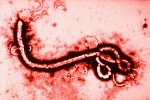 News that a U.S. based health-care worker in Dallas has contracted Ebola while caring for a patient with the disease has raised questions about the protections that health care facilities and other employers must provide for workers who might be exposed to Ebola. I asked my health care law colleagues Herschel Goldfield, Senior Counsel in Proskauer’s Health Care Practice, and Rick Zall, Head of Proskauer’s Health Care Practice, to be guest bloggers on our Law & the Workplace blog and provide additional information for these employers. They were more than happy to oblige. Here’s what they had to say.
News that a U.S. based health-care worker in Dallas has contracted Ebola while caring for a patient with the disease has raised questions about the protections that health care facilities and other employers must provide for workers who might be exposed to Ebola. I asked my health care law colleagues Herschel Goldfield, Senior Counsel in Proskauer’s Health Care Practice, and Rick Zall, Head of Proskauer’s Health Care Practice, to be guest bloggers on our Law & the Workplace blog and provide additional information for these employers. They were more than happy to oblige. Here’s what they had to say.
Health care facilities have always been concerned with maintaining appropriate protections against the transmission of communicable diseases, and the implementation of universal precautions is routine. While at this time, there is no clear indication that a failure to follow procedures was the cause of transmission, nevertheless, hospitals should take steps to assure that their front-line staff is trained in appropriate personal protection procedures. Other employers, such as mortuaries, labs, aid organizations, waste management companies and airlines may have less experience than health care employers in this regard, but are among the types of companies that also may have employees that could be exposed to Ebola.
The Centers for Disease Control & Prevention (CDC) has issued multiple guidance documents on dealing with Ebola patients and specimens including specimen handling guidelines and guidance for monitoring and movement of potentially exposed individuals. In addition to normal guidelines regarding the use of personal protective equipment (PPE), the CDC has posted on its website Interim Guidance for Environmental Infection Control in Hospitals for Ebola Virus, specific guidance regarding the process of donning and removing PPE, and Interim Guidance for EMS Systems . The CDC has issued numerous other guidance documents and may issue new and updated recommendations based on recent developments. Employers with concerns in this area should monitor the CDC for future developments.
In addition, employers should note that the Occupational Safety & Health Administration (OSHA) has issued standards that are relevant to protecting employees against Ebola. OSHA’s Bloodborne Pathogens Standard should be followed by all employers with employees at risk of being exposed to bloodborne pathogens. Under the Bloodborne Pathogens Standard, any employer that employs individuals who would be reasonably anticipated to have contact with blood or other potentially infectious materials from the performance of the employee’s duties must have an Exposure Control Plan designed to minimize employee exposure. Development of the Exposure Control Plan includes creating a list of all job classifications in which employees have some occupational exposure, and a list of the tasks and procedures in which such occupational exposure might take place. OSHA’s website contains a model Exposure Control Plan. OSHA has also cited the applicability of its Respiratory Protection Standard and PPE Standard.
OSHA recommends that the CDC’s Ebola guidance be followed for healthcare and laboratory workers, but provides its own guidance for other workers. On October 9, airplane cleaners at one terminal at LaGuardia Airport staged a one-day strike to protest the lack of protective equipment and training, citing recent OSHA guidance on the need to issue PPE to cleaning workers.
The key in the implementation of OSHA standards is differentiating between situations in which there is a reasonable risk of the presence of Ebola infection, as opposed to hysteria without foundation. Generally, in the cleaning context, this will be limited to surfaces that have been in contact with fluids from an individual known to have or suspected to have the virus.
OSHA is likely to issue further guidance if the outbreak continues, and employers with large numbers of employees who travel or who may otherwise be exposed should monitor CDC and OSHA websites for updates.